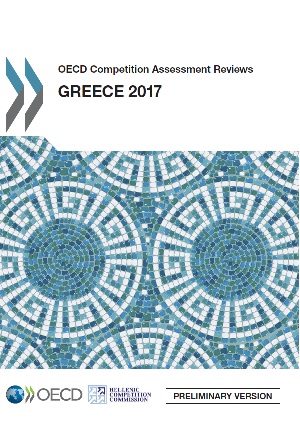Obstfeld, Maurice, M. Thomsen, Poul, (2016), “The IMF is not asking Greece for more austerity”, IMF direct, 12 December Greece is once again in the headlines as discussions for the second review of its European Stability Mechanism (ESM) program are gaining pace. Unfortunately, the discussions have also spurred some misinformation about the role and the views of the IMF. Above all, the IMF is being criticized for demanding more fiscal …Read More
A Closer Look to External Trade: Greece’s Export Performance
Lekkos, Ilias, Leventakis, Artemis, (2016), “A Closer Look to External Trade: Greece’s Export Performance”, Piraeus Bank, 9 December Greece’s trade balance in terms of GDP has improved substantially in the last eight years (from 12.6% deficit in 2008 to marginal surplus of 0.1% in 2015), correcting one of the long-term macroeconomic imbalances of the Greek economy. However, this improvement was achieved through sharp import contraction taking into account that imports decreased …Read More
Brain drain and the Greek crisis
Labrianidis, Lois, Pratsinakis, Manolis, (2016), “Brain drain and the Greek crisis”, LSE Hellenic Observatory, 6 December In the context of the debt crisis, recession, austerity and their socio-political consequences, Greece is experiencing a new major wave of out-migration. Emigration has become a survival strategy for many people who are finding it hard to make ends meet, while, at the same time, it has also emerged as an increasingly appealing option …Read More
IMF Indecision on Bailout Faulted by Greek Economy Minister
Bensasson, Marcus, (2016), “IMF Indecision on Bailout Faulted by Greek Economy Minister”, Levy Economics Institute, 28November The time has come for the International Monetary Fund to make up its mind on Greece, according to the country’s economy minister. The path to recovery runs sequentially through completion of Greece’s bailout review, debt relief and then admission to the European Central Bank’s quantitative easing program, said Dimitri Papadimitriou, an economist who joined …Read More
The Determinants of Loan Loss Provisions: An Analysis of the Greek Banking System in Light of the Sovereign Debt Crisis
Monokroussos, Platon, D. Thomakos, Dimitrios, A. Alexopoulos, Thomas, (2016), “The Determinants of Loan Loss Provisions: An Analysis of the Greek Banking System in Light of the Sovereign Debt Crisis”, LSE Hellenic Observatory GreeSE Paper No.104, November We utilize a new set of macroeconomic and regulatory data to analyze the evolution of loan loss provisioning practices in the Greek banking system over the period 2005-2015. We explore the determinants of the aggregate …Read More
Second programme review – Important milestones & timeline of key dates and events
Petropoulou, Paraskevi, Dimitriadou, Anna, (2016), “Second programme review – Important milestones & timeline of key dates and events”, Eurobank Research, 18 November This report presents the key themes of the current juncture in light of the 2nd programme review, which is well underway and its importance to the Greek economy’s short and medium term prospects. Firstly, we present the key milestones ahead that will determine whether Greece will be able …Read More
The time is up! A realistic proposal to end Greece’s debt overhang
Marsh, Chris, Nagly, Dominik, Pagoulatos, George, Papaioannou, Elias, (2016), “The time is up! A realistic proposal to end Greece’s debt overhang”, VoxEu, 17 November It is now seven years since the Greek crisis began. As well as reflecting the chronic deficiencies of its own institutions, the failings in Greece also reflect substantial shortcomings in international institutions. This column argues that it is time for all sides to move on, and proposes …Read More
Inter-industry wage differentials in Greece: rent-sharing and unobserved heterogeneity hypotheses
Papapetrou, Evangelia, Tsalaporta, Pinelopi, (2016), “Inter-industry wage differentials in Greece: rent-sharing and unobserved heterogeneity hypotheses”, Bank of Greece, 10 November This paper examines the structure and determinants of inter-industry wage differentials in Greece, along with the role of the rent-sharing and unobserved heterogeneity hypotheses, employing restricted least squares and quantile regression techniques with cluster robust standard errors at the firm level. To this end, a unique dataset, the European Union Structure …Read More
OECD Competition Assessment Reviews – GREECE 2017
OECD, (2016), “OECD Competition Assessment Reviews – GREECE 2017”, OECD Publishing, 7 November After suffering one of the longest and most serious economic crises ever experienced by any European country, which resulted in a severe drop of real GDP and major losses in employment and incomes, the Greek economy is projected to improve in 2016-2017. Progress has been made in balancing the budget and implementing significant labour market and fiscal …Read More
QE for Greece: a necessary precondition for stabilizing investor sentiment and preventing the need for further official sector financing post-2018
Monokroussos, Platon, (2016), “QE for Greece: a necessary precondition for stabilizing investor sentiment and preventing the need for further official sector financing post-2018”, Eurobank, 25 October Taking into consideration the most recent comments by a number of key EU officials on Greece’s possible inclusion in the ECB’s quantitative easing (QE) program this note updates our recent analysis on the issue, focusing on the key preconditions for and the potential timeline …Read More





